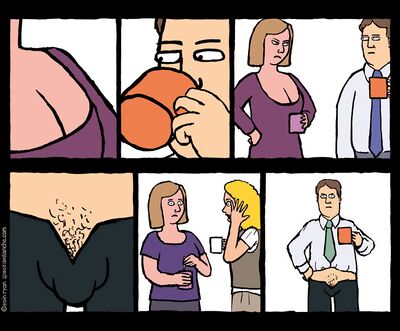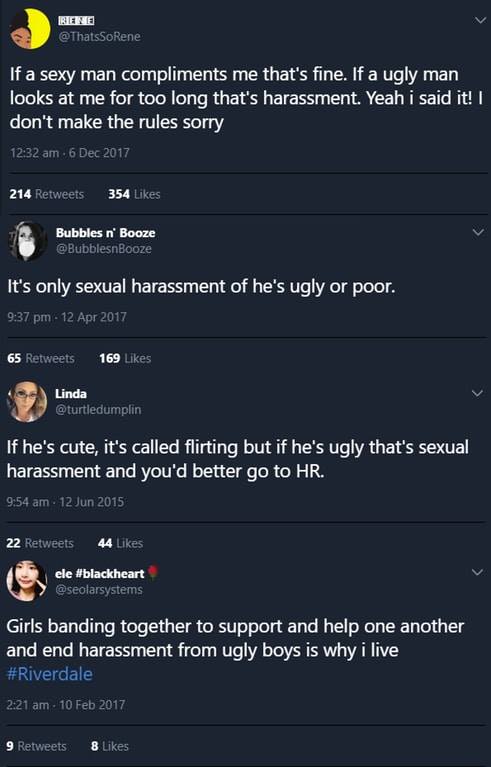Sexual harassment
In women's own words, sexual harassment is what occurs when an unattractive man makes a flirtatious advance on a woman who does not find him attractive. The problem with this conceptualization of the issue is that legally speaking you cannot have different sets of rules for ugly men and attractive men. If it is okay for Chad to say "Hey Linda, love that dress, it fits you so nice!", but it is sexual harassment for an ugly guy to say it, you have created a human rights violation.[1]
In an incredibly naive act, feminism has torn down gender segregation at work, leading to increased time men and women spend together, increasing the potential for sexual tensions, misunderstandings, unwanted sexual advances, etc. As a result, workplace sexual harassment has become an issue of increasing urgency and as a result of that in turn, harassment laws have been sharpened and women are essentially trying to turn the world into their living room. With widened definition of rape, also the definition of harassment has widened over time. For example, the percentage of women who perceive cat calling or staring as harassment has dramatically increased in the past decades.[2] As a result, an increasing percentage of men refuse to cooperate with women at workplace, and avoid being alone with them in one room.[3]
Hilariously, women themselves admit, that whether something counts as harassment depends on the physical attractiveness of the harasser.[4] There is evidence that moderate lifetime adversity has a steeling effect, i.e. individuals who have faced some difficulties in their lives are on average in better psychological shape than others.[5] This brings into question whether harassment is harmful at all provided that it neither causes physical harm, nor long-term deprivation of basic needs (which would count as severe adversity).
Contrary to feminist claims that male misogyny is the main cause of sexual harassment, a study in 2017 found that a measure of sociosexual orientation (level of mating effort and openness toward casual sex) predicted sexual harassment, not "rape myth acceptance" or misogyny, this also implies that claims of sexual harassment are often simply an offended women's reaction to a unsolicited offer to engage in casual sex by a man she finds undesirable, as stated by the authors of the paper: "when the solicitation comes from a desirable perpetrator the same type of behavior might not even be experienced as harassment".[6]
Gallery[edit | edit source]
References[edit | edit source]
- ↑ http://www.thehappytalent.com/blog/what-men-dont-understand-when-they-complain-its-only-creepy-if-the-guy-isnt-hot
- ↑ https://incels.wiki/w/Scientific_Blackpill#28.25_of_young_women_now_consider_men_even_winking_at_them_to_be_sexual_harassment
- ↑ https://incels.wiki/w/Scientific_Blackpill#27.25_of_men_report_avoiding_one-on-one_meetings_with_female_work_colleagues
- ↑ https://incels.wiki/w/Scientific_Blackpill#Women.27s_definition_of_.27harassment.27_in_online_dating_depends_on_the_attractiveness_of_the_man
- ↑ https://econtent.hogrefe.com/doi/abs/10.1027/2512-8442/a000011
- ↑ https://www.sciencedirect.com/science/article/abs/pii/S1090513817300016

